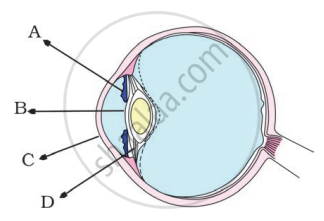Advertisements
Advertisements
प्रश्न
Name the following:
Short sightedness.
उत्तर
Myopia
APPEARS IN
संबंधित प्रश्न
Write the function of the following part of the human eye: crystalline lens
What is the name of:
the curved, transparent front surface of the eye?
What is the name of:
the light-sensitive layer in the eye?
Fill in the following blank with suitable word:
Most of the refraction of light rays entering the eye occurs at the outer surface of the.............
What is presbyopia? Write two causes of this defect. Name the type of lens which can be used to correct presbyopia.
A man driving a car can read a distant road sign clearly but finds difficulty in reading the odometer on the dashboard of the car. Which of the following statement is correct about this man?
(a) The near point of his eyes has receded away.
(b) The near point of his eyes has come closer to him.
(c) The far point of his eyes has receded away.
(d) The far point of his eyes has come closer to him.
How much is our field of view:
with one eye open?
Out of animals of prey and predators, which have their eyes:
on the opposite sides of their head?
Mention if the following statement is true (T) or false (F) Give reason.
Sometimes medicines dropped into the eyes come into the nose and even throat
Give the main function of the following:
Three semicircular canals
State the Function:
Choroid coat in the eye
The muscular diaphragm that controls the size of the pupil is ____________.
In the figure of the human eye, the cornea is represented by the letter

Match the following:
| Column - I | Column - II |
| 1. Retina | a. Path way of light |
| 2. Pupil | b. Far point comes closer |
| 3. Ciliary muscles | c. near point moves away |
| 4. Myopia | d. Screen of the eye |
| 5. Hypermetropia | e. Power of accommodation |
State the functions of the following:
Ciliary muscles
An aperture that controls the passage of light into the eye is ______.
Match the terms in column I with those in column II and write down the matching pairs.
| Column I | Column II | ||
| (i) | Conjunctiva | (a) | Viral infection |
| (ii) | Cornea | (b) | Ciliary body |
| (iii) | Choroid | (c) | Spiral-shaped |
| (iv) | Cochlea | (d) | Transparent epithelium |
| (v) | Conjunctivitis | (e) | Suspensory ligament |
| (f) | Contains melanin | ||
| (g) | Transparent but appears black |
Name the following:
Two pigments of the sensory cells.
